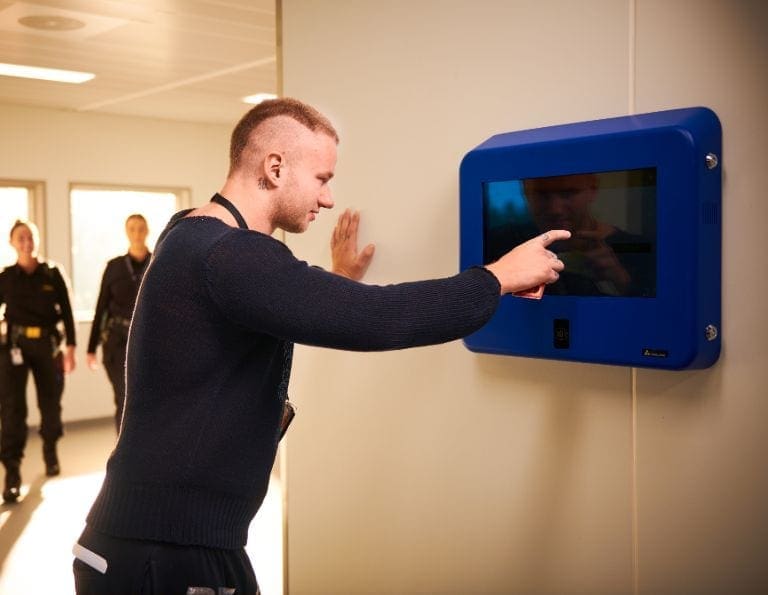Steven Van De Steene, Enterprise Architect and Technology for Corrections Expert
With Unilink as a partner, I’m proud to be part of the digital transformation project in Norway. This project is broader than implementing new, state of the art technology to support Kriminalomsorgen with the management of offenders both in prisons and the community. It is the undertaking of a collaborative journey to explore and understand how technology can improve and enforce their globally recognised innovative approach towards the execution of sentences and offender rehabilitation.
For many years the Norwegian Correctional service has adopted the principle of normality as the core of the correctional process. The principle of ‘normality’ states that life under execution of sentences should resemble life outside as far as possible: the punishment is the restriction of liberty; no other rights have been removed by the sentencing court. The sentenced offender has all the same rights as all others who live in Norway. No-one shall serve their sentence under stricter circumstances than necessary for the security in the community. Therefore, offenders shall be placed in the lowest possible security regime[1].
By implementing this principle Norway is leading in the implementation of international standards and recommendations that are increasingly focused on the importance of prisoner rights, wellbeing and rehabilitation. A common definition of this principle of normality can be found in the Council of Europe’s recommendation on Prison Rules (2006) part 1, number 2: “Life in prison shall approximate as closely as possible the positive aspects of life in the community”[2]. Also, the United Nations Standard Minimum Rules for the Treatment of Prisoners, better known as the Nelson Mandela Rules, include an explicit statement that hints the same principle: […] the prison regime should seek to minimize any differences between prison life and life at liberty that tend to lessen the responsibility of the prisoners or the respect due to their dignity as human beings […].
In the current society characterised by rapid technological changes and the mediatization of all areas of life, the implementation of the principle of normality has become even more difficult. Digital technology has altered how we get information or how services are delivered. New technologies have reshaped how we communicate and collaborate, but while digital has become the ‘new normal’[3] outside, prison services are still struggling to shape and use digital space to fit their needs and enable it for the offenders inside[4].
It’s only relatively recently that we see an increasing interest from correctional practitioners, academia and national and international organisations on the impact new technologies and a changing digital society has on our prisons, prison management, and rehabilitation efforts & outcomes. We start realising that current prisoner rehabilitation, re-entry models, and practices hardly target this digital realm[5] and potentially lead to reinforcing a revolving door effect. Non-existent to low digital skills and concepts of digital rehabilitation are becoming part of our correctional focus.
New digital technologies are not only playing an increasing role in prison education and the rehabilitation of offenders[6] but are also successfully used to improve efficiency and the delivery of services that are otherwise hard to offer inside. A recent Dutch study[7] proves the positive effect on behaviour and health of more normalised detention regimes supported by offering offenders a digital key to their cell door and installing in-cell telephone and self-servicing technologies. This shows that a purposeful and well-designed implementation of technology can really make a difference. Similarly, a recent chapter in The Palgrave Handbook of International Cybercrime and Cyberdeviance [8] includes a detailed analysis of the success of Unilink’s self-service in the United Kingdom, showing a significant improvement of reduced recidivism in prisons with Unilink’s self-service versus the comparator group.
Shaping correctional practice around the principle of Normality today is impossible to do without taking into count the digital reality outside. Technology can help us create more open, respectful and normalised environments to give offenders back some creativity, personal security and sense of reality. Where offenders can make choices. We can import concepts and services from the outside society which are today increasingly delivered in a digital way. We can enable digital participation and open access to digital communication and digital information, and we should: the new normal is digital.
________________________________________
[1] http://www.kriminalomsorgen.no/
[2] Council of Europe (2006) Recommendation Rec (2006) 2 of the Committee of Ministers to Member States on the European Prison Rules.
[3] Hinnsen P (2011) The New Normal: Exploring the Limits of the Digital World. Mach Media N.V.
[4] Knight V and Van De Steene S (2017) Digital transformation for prisons: Developing a needs-based strategy. Probation Journal 1-13 – journals.sagepub.com/home/prb
[5] Bianca C and Rikard RV (2018) Digital Rehabilitation: A Model of Reentry Into the Digital Age
[6] Elison-Davies S., Davies G, Ward J., Dugdale S. & Weekes J. (2018): The Role of technology in offender rehabilitation, Advancing Corrections journal #5, Article 9 – www.icpa.org
[7] Vollaard B, Knoef M and van Dijk T (2019): Het effect van een alternatief detentieregime op gedrag en gezondheid van gedetineerden – een experiment in een penitentiaire inrichting. https://www.tilburguniversity.edu
[8] McDougall C., Pearson D.A.S.(2019) Technology as a Means of Rehabilitation: A Measurable Impact on Reducing Crime https://link.springer.com/referenceworkentry/10.1007%2F978-3-319-90307-1_71-1
Steven Van De Steene is an Enterprise Architect and Technology for Corrections Expert. He works as a researcher and consultant in the area of innovation and technology strategy for prisons and probation services. Steven has a long experience in international projects related to digital transformation in corrections and currently is a Board Member and the coordinator of the Technology Solutions Group for the International Prisons and Corrections Association (ICPA).
Prior to this current position he was the IT Director of the Penitentiary Institutions in Belgium and chair of the Technology Expert Group within Europris.
Share








